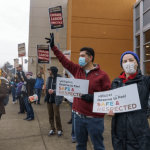
House Republicans intensified their scrutiny of Ur Jaddou, the head of U.S. Citizenship and Immigration Services (USCIS), during a heated Judiciary Committee hearing.
House Republicans intensified their scrutiny of Ur Jaddou, the head of U.S. Citizenship and Immigration Services (USCIS), during a heated Judiciary Committee hearing. They accused her and the Biden administration of fostering mass illegal immigration and mismanaging a humanitarian parole program riddled with fraud.
Criticism of USCIS Leadership
“You totally blew it,” declared Rep. Troy Nehls of Texas, voicing frustration at what he called a betrayal of the agency’s mission. USCIS is responsible for overseeing lawful immigration into the United States, but under Jaddou’s leadership, critics claim it has veered off course.
Nehls continued his fiery critique, stating, “The American people are sick and tired, and you should all be fired. Well, you will be shortly because the American people said, ‘We ain’t going to tolerate this anymore.’”
Rep. Tom McClintock, chair of the Subcommittee on Immigration Integrity, Security, and Enforcement, echoed Nehls’ sentiments. He attributed declining real wages for working families to policies overseen by USCIS, which he argued have flooded the labor market with unauthorized workers. “If anyone wonders why real wages for working families have declined under this administration, look no further than the agency before us today,” McClintock said.
He also criticized the agency’s failure to conduct credible fear interviews before releasing migrants into the U.S. “How do you explain that?” he asked Jaddou, pressing her for accountability.
USCIS Funding and Operational Issues
Jaddou defended her agency, citing chronic underfunding as a significant challenge. USCIS primarily operates on fees collected from applicants, but Jaddou claimed these resources were no longer sufficient.
McClintock dismissed this explanation, arguing that before the borders were opened under the Biden administration, these fees were adequate to manage the agency’s workload. “Under your administration, they’re not,” he said, suggesting mismanagement rather than resource scarcity was to blame.
Controversy Over the CHNV Parole Program
The hearing focused heavily on the Cubans, Haitians, Nicaraguans, and Venezuelans (CHNV) parole program, which the Biden administration initiated in January 2023. The program permits up to 30,000 migrants from these countries to enter the U.S. monthly. While intended to provide temporary entry under exigent circumstances, critics allege it has been exploited for mass admissions.
McClintock accused the administration of transforming the program into a tool for illegal chain migration. “They took a parole authority that required case-by-case review of individual exigent circumstances… and turned it into a fraud-ridden, mass admission of more than half a million migrants,” he said.
The program was temporarily paused in July due to fraud concerns but was reinstated shortly after. The subcommittee’s November report revealed that over 530,000 migrants entered the U.S. through the program.
Fraud Allegations and Lax Vetting
Ohio Rep. Jim Jordan confronted Jaddou about allegations of widespread fraud within the CHNV program. He pointed out that the program allows migrants to sponsor other migrants, a practice he argued undermines its integrity. Jaddou acknowledged this, admitting that while 86% of sponsors are U.S. citizens or lawful residents, questions remain about the remaining 14%.
Rep. Andy Biggs of Arizona went further, citing evidence of systemic abuse. “Hundreds of applications used the same Social Security number, email address, and zip code,” Biggs said. “This program is rife with fraud.” He criticized USCIS for failing to address these issues despite pausing the program earlier in the year.
Broader Concerns About Immigration Policy
Rep. Wesley Hunt of Texas accused the Biden administration of circumventing legal pathways to mask the crisis at the border. “Do you know how you reduce illegal immigration, according to the left? It’s simple. You make illegal immigration legal,” Hunt said.
Hunt alleged that the administration had expanded parole’s intended use to inflate legal immigration numbers artificially. “Biden was upset that the American people were complaining about the increase in illegal immigration at the border,” Hunt said. “So, what did he do? He legalized illegal immigration by expanding parole.”
Jaddou’s Defense
Throughout the hearing, Jaddou maintained that USCIS is fulfilling its duties, including managing the CHNV program as part of a broader border strategy. “It cannot work alone,” she said, emphasizing the need for enforcement and management measures to work in tandem.
She also highlighted that the CHNV program is just one component of the administration’s approach to border management. However, Republicans remained unconvinced, arguing that the agency’s actions have undermined U.S. immigration laws and strained public resources.
The heated exchange underscored deep divisions over immigration policy in the U.S. With Republicans pushing for stricter enforcement and greater oversight, the Biden administration faces growing pressure to address allegations of fraud and mismanagement. As public frustration mounts, the future of programs like CHNV—and USCIS itself—remains uncertain.







